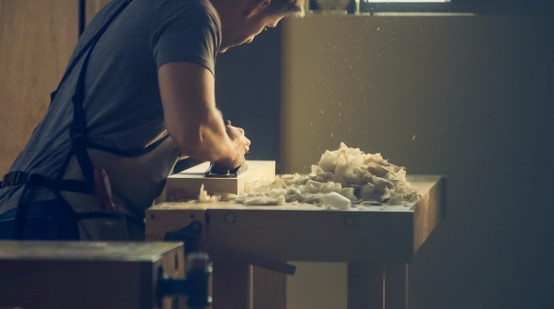If you’ve had extra time on your hands lately and have landed on this page, chances are you’re turning to woodworking. This doesn’t come as a surprise! After all, this is a great hobby to have especially since it helps spruce up interiors and exteriors. It’s such a great activity that does so much more than just pass the time.
Woodworking has been linked to better health for helping people stay both physically and mentally active. The skill that comes with learning the art of woodworking is greatly rewarding while also perfect for bringing fresh, unique pieces to your home decor. But before you jump in with hammer and nail at the ready, don’t forget to consider these essential components to creating a piece you are proud of.

1. Find the Perfect Project
There is no use overwhelming yourself with a difficult project when giving woodworking your first try. With thousands of novice woodworking online, peruse until you find something you are both excited about and is recommended for your level of expertise.
Take stock as well of what tools and materials you have, and see if there is a project that aligns with what is already available so that you can minimize the search. When you can find a project that excites you, can utilize the materials you already have, and is appropriate for your level of expertise, you know it’s the right project for you!
2. Don’t Forget the Wood
Finding the right wood, treatments, paint, and stains is important. However, with so many options, it’s easy to be unsure of where to start. It is important to choose the wood that is best for your project and treating it will bring your project to life.
Check out woodhappen.com tutorials for guidance on easing the selection project and how to put those materials to their best use. When in doubt, tutorials like these and reaching out to experts will help you make the best choice for your project.
3. What Tools You Need (And Don’t!)
Does woodworking mean going out and buying hundreds of dollars worth of power tools and gadgets before you ever touch wood?
No! As mentioned above, find the project that works for you, but also find the tools that work for you. Simple items such as a good saw, shaver, hammer, and nails can be most of what you need for simple, novice projects.
As you explore projects and find what works for you, you can expand your collection. Buy as needed rather than making purchases that will only collect dust on a shelf.
On a similar note, having a space for woodworking is important, but don’t overthink what that space needs to look like. Being able to move around and feel comfortable working is important. Spaces like garages are ideal as it allows for easy cleanup. Whatever space is large enough to accommodate your project and makes you feel comfortable.
4. Your First Project Won’t Be Your Best
Woodworking is a skill that lasts a lifetime and with each project, you sharpen those skills. For a first project, expect to make mistakes and learn some things the hard way. Rome wasn’t built in a day and neither will your crafting skills appear overnight!
Every project is an investment in yourself and what you can accomplish as a woodworker. Enjoy the learning process and celebrate all successes.
Conclusion
Learning the art of woodworking can be just as simple as you want it to be. Seek out simple projects, commit to making and learning from mistakes, and don’t forget to utilize the free resources that are available across the internet. This invaluable skill is a great way to stay active, no matter what life brings!
I’m a 20-something stay-at-home mother and wife. I have an amazing husband, a beautiful daughter, two loving dogs, and a lazy cat. I wouldn’t change my life for anything! I love to read, listen to music, cook and blog!

Speak Your Mind